-
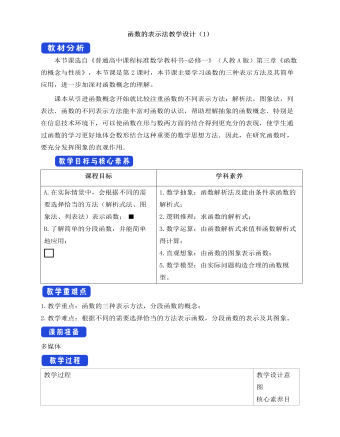
人教A版高中数学必修一函数的表示法教学设计(1)
本节课选自《普通高中课程标准数学教科书-必修一》(人教A版)第三章《函数的概念与性质》,本节课是第2课时,本节课主要学习函数的三种表示方法及其简单应用,进一步加深对函数概念的理解。课本从引进函数概念开始就比较注重函数的不同表示方法:解析法,图象法,列表法.函数的不同表示方法能丰富对函数的认识,帮助理解抽象的函数概念.特别是在信息技术环境下,可以使函数在形与数两方面的结合得到更充分的表现,使学生通过函数的学习更好地体会数形结合这种重要的数学思想方法.因此,在研究函数时,要充分发挥图象的直观作用.课程目标 学科素养A.在实际情景中,会根据不同的需要选择恰当的方法(解析式法、图象法、列表法)表示函数;B.了解简单的分段函数,并能简单地应用;1.数学抽象:函数解析法及能由条件求函数的解析式;2.逻辑推理:求函数的解析式;
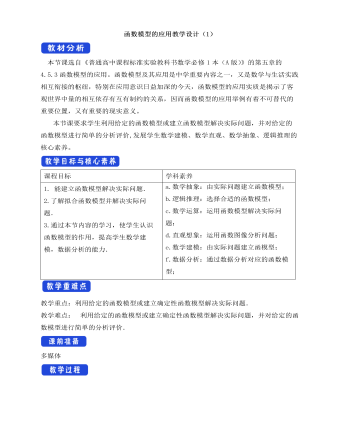
人教A版高中数学必修一函数模型的应用教学设计(1)
本节课选自《普通高中课程标准实验教科书数学必修1本(A版)》的第五章的4.5.3函数模型的应用。函数模型及其应用是中学重要内容之一,又是数学与生活实践相互衔接的枢纽,特别在应用意识日益加深的今天,函数模型的应用实质是揭示了客观世界中量的相互依存有互有制约的关系,因而函数模型的应用举例有着不可替代的重要位置,又有重要的现实意义。本节课要求学生利用给定的函数模型或建立函数模型解决实际问题,并对给定的函数模型进行简单的分析评价,发展学生数学建模、数学直观、数学抽象、逻辑推理的核心素养。1. 能建立函数模型解决实际问题.2.了解拟合函数模型并解决实际问题.3.通过本节内容的学习,使学生认识函数模型的作用,提高学生数学建模,数据分析的能力. a.数学抽象:由实际问题建立函数模型;b.逻辑推理:选择合适的函数模型;c.数学运算:运用函数模型解决实际问题;

人教A版高中数学必修一集合的基本运算教学设计(1)
本节是新人教A版高中数学必修1第1章第1节第3部分的内容。在此之前,学生已学习了集合的含义以及集合与集合之间的基本关系,这为学习本节内容打下了基础。本节内容主要介绍集合的基本运算一并集、交集、补集。是对集合基木知识的深入研究。在此,通过适当的问题情境,使学生感受、认识并掌握集合的三种基本运算。本节内容是函数、方程、不等式的基础,在教材中起着承上启下的作用。本节内容是高中数学的主要内容,也是高考的对象,在实践中应用广泛,是高中学生必须掌握的重点。A.理解两个集合的并集与交集的含义,会求简单集合的交、并运算;B.理解补集的含义,会求给定子集的补集;C.能使用 图表示集合的关系及运算。 1.数学抽象:集合交集、并集、补集的含义;2.数学运算:集合的运算;3.直观想象:用 图、数轴表示集合的关系及运算。
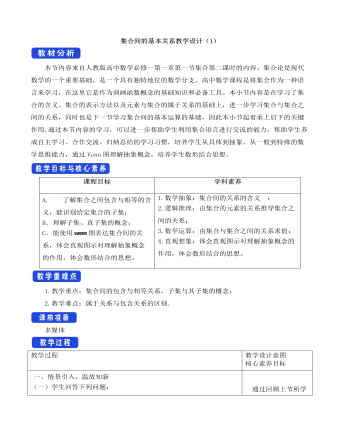
人教A版高中数学必修一集合间的基本关系教学设计(1)
本节内容来自人教版高中数学必修一第一章第一节集合第二课时的内容。集合论是现代数学的一个重要基础,是一个具有独特地位的数学分支。高中数学课程是将集合作为一种语言来学习,在这里它是作为刻画函数概念的基础知识和必备工具。本小节内容是在学习了集合的含义、集合的表示方法以及元素与集合的属于关系的基础上,进一步学习集合与集合之间的关系,同时也是下一节学习集合间的基本运算的基础,因此本小节起着承上启下的关键作用.通过本节内容的学习,可以进一步帮助学生利用集合语言进行交流的能力,帮助学生养成自主学习、合作交流、归纳总结的学习习惯,培养学生从具体到抽象、从一般到特殊的数学思维能力,通过Venn图理解抽象概念,培养学生数形结合思想。

人教A版高中数学必修一诱导公式教学设计(1)
一、复习回顾,温故知新1. 任意角三角函数的定义【答案】设角 它的终边与单位圆交于点 。那么(1) (2) 2.诱导公式一 ,其中, 。终边相同的角的同一三角函数值相等二、探索新知思考1:(1).终边相同的角的同一三角函数值有什么关系?【答案】相等(2).角 -α与α的终边 有何位置关系?【答案】终边关于x轴对称(3).角 与α的终边 有何位置关系?【答案】终边关于y轴对称(4).角 与α的终边 有何位置关系?【答案】终边关于原点对称思考2: 已知任意角α的终边与单位圆相交于点P(x, y),请同学们思考回答点P关于原点、x轴、y轴对称的三个点的坐标是什么?【答案】点P(x, y)关于原点对称点P1(-x, -y)点P(x, y)关于x轴对称点P2(x, -y) 点P(x, y)关于y轴对称点P3(-x, y)

人教A版高中数学必修一任意角教学设计(1)
本节课选自《普通高中课程标准数学教科书-必修一》(人 教A版)第五章《三角函数》,本节课是第1课时,本节主要介绍推广角的概念,引入正角、负角、零角的定义,象限角的概念以及终边相同的角的表示法。树立运动变化的观点,并由此进一步理解推广后的角的概念。教学方法可以选用讨论法,通过实际问题,如时针与分针、体操等等都能形成角的流念,给学生以直观的印象,形成正角、负角、零角的概念,明确规定角的概念,通过具体问题让学生从不同角度理解终边相同的角,从特殊到一般归纳出终边相同的角的表示方法。A.了解任意角的概念;B.掌握正角、负角、零角及象限角的定义,理解任意角的概念;C.掌握终边相同的角的表示方法;D.会判断角所在的象限。 1.数学抽象:角的概念;2.逻辑推理:象限角的表示;3.数学运算:判断角所在象限;4.直观想象:从特殊到一般的数学思想方法;
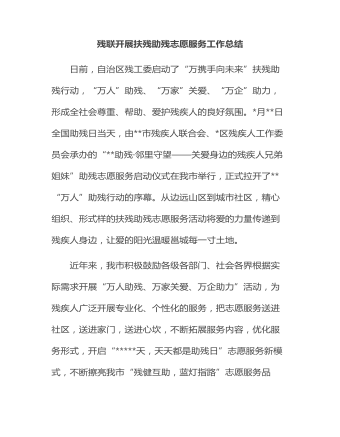
残联开展扶残助残志愿服务工作总结
日前,自治区残工委启动了“万携手向未来”扶残助残行动,“万人”助残、“万家”关爱、“万企”助力,形成全社会尊重、帮助、爱护残疾人的良好氛围。*月**日全国助残日当天,由**市残疾人联合会、*区残疾人工作委员会承办的“**助残·邻里守望——关爱身边的残疾人兄弟姐妹”助残志愿服务启动仪式在我市举行,正式拉开了**“万人”助残行动的序幕。从边远山区到城市社区,精心组织、形式样的扶残助残志愿服务活动将爱的力量传递到残疾人身边,让爱的阳光温暖邕城每一寸土地。近年来,我市积极鼓励各级各部门、社会各界根据实际需求开展“万人助残、万家关爱、万企助力”活动,为残疾人广泛开展专业化、个性化的服务,把志愿服务送进社区,送进家门,送进心坎,不断拓展服务内容,优化服务形式,开启“*****天,天天都是助残日”志愿服务新模式,不断擦亮我市“残健互助,蓝灯指路”志愿服务品牌,让广大残疾人走出家门,融入社会,共享美好的生活。
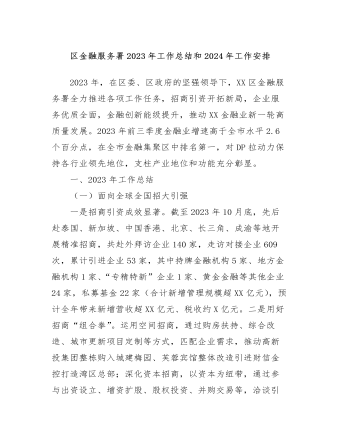
区金融服务署2023年工作总结和2024年工作安排
(二)全面系统优规划强园区一是加强赴外招商推介、挖掘龙头机构在深投资意向。二是持续引领数字人民币在预付费监管、智慧养老消费、智慧园区等领域先行示范,加快应用场景创新,吸引数字人民币上下游产业链企业汇集XX,促进产业培育发展,推动数字人民币从“应用试点”转向“应用生态”;三是依托保险机构集聚优势,创新商业保险供给方式,鼓励IDI、幕墙险、跨境医疗险等创新试点,围绕保险参与基层治理、保障社会民生、推进深港融合等领域激发创新活力。四是联合上海黄金交易所探索打造集中高效的场外黄金流转库,规范场外黄金交易链条。谋划构建黄金金融融资交易流转系统,打造金融精准支持实体产业的深圳先行示范样板。(三)全心全意提质量促服务一是继续开展“融·易·XX”企业融资对接和政策宣讲活动,延展金融服务触角,针对市区最新政策、创新做法、金融产品进行深度解读,为辖区企业及时输送政策给养,提供优质政策支撑,保障辖区中小微企业稳健发展;二是继续跟进重点企业融资纾困项目,协调授信银行不抽贷、不断贷,支持企业平稳化解流动性压力;三是继续做好重点企业服务。
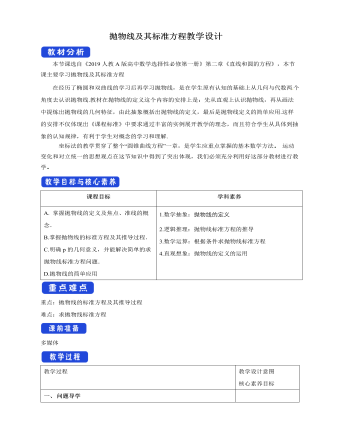
抛物线及其标准方程教学设计人教A版高中数学选择性必修第一册
本节课选自《2019人教A版高中数学选择性必修第一册》第二章《直线和圆的方程》,本节课主要学习抛物线及其标准方程在经历了椭圆和双曲线的学习后再学习抛物线,是在学生原有认知的基础上从几何与代数两 个角度去认识抛物线.教材在抛物线的定义这个内容的安排上是:先从直观上认识抛物线,再从画法中提炼出抛物线的几何特征,由此抽象概括出抛物线的定义,最后是抛物线定义的简单应用.这样的安排不仅体现出《课程标准》中要求通过丰富的实例展开教学的理念,而且符合学生从具体到抽象的认知规律,有利于学生对概念的学习和理解.坐标法的教学贯穿了整个“圆锥曲线方程”一章,是学生应重点掌握的基本数学方法 运动变化和对立统一的思想观点在这节知识中得到了突出体现,我们必须充分利用好这部分教材进行教学
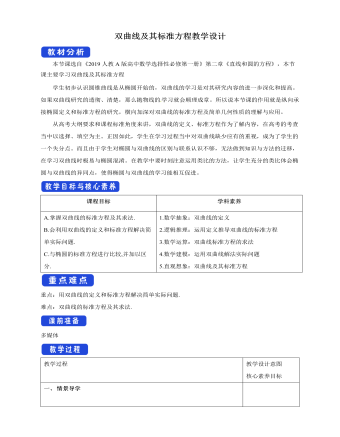
双曲线及其标准方程教学设计人教A版高中数学选择性必修第一册
∵在△EFP中,|EF|=2c,EF上的高为点P的纵坐标,∴S△EFP=4/3c2=12,∴c=3,即P点坐标为(5,4).由两点间的距离公式|PE|=√("(" 5+3")" ^2+4^2 )=4√5,|PF|=√("(" 5"-" 3")" ^2+4^2 )=2√5,∴a=√5.又b2=c2-a2=4,故所求双曲线的方程为x^2/5-y^2/4=1.5.求适合下列条件的双曲线的标准方程.(1)两个焦点的坐标分别是(-5,0),(5,0),双曲线上的点与两焦点的距离之差的绝对值等于8;(2)以椭圆x^2/8+y^2/5=1长轴的端点为焦点,且经过点(3,√10);(3)a=b,经过点(3,-1).解:(1)由双曲线的定义知,2a=8,所以a=4,又知焦点在x轴上,且c=5,所以b2=c2-a2=25-16=9,所以双曲线的标准方程为x^2/16-y^2/9=1.(2)由题意得,双曲线的焦点在x轴上,且c=2√2.设双曲线的标准方程为x^2/a^2 -y^2/b^2 =1(a>0,b>0),则有a2+b2=c2=8,9/a^2 -10/b^2 =1,解得a2=3,b2=5.故所求双曲线的标准方程为x^2/3-y^2/5=1.(3)当焦点在x轴上时,可设双曲线方程为x2-y2=a2,将点(3,-1)代入,得32-(-1)2=a2,所以a2=b2=8.因此,所求的双曲线的标准方程为x^2/8-y^2/8=1.当焦点在y轴上时,可设双曲线方程为y2-x2=a2,将点(3,-1)代入,得(-1)2-32=a2,a2=-8,不可能,所以焦点不可能在y轴上.综上,所求双曲线的标准方程为x^2/8-y^2/8=1.
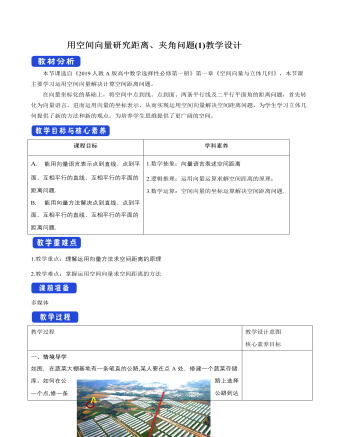
用空间向量研究距离、夹角问题(1)教学设计人教A版高中数学选择性必修第一册
二、探究新知一、点到直线的距离、两条平行直线之间的距离1.点到直线的距离已知直线l的单位方向向量为μ,A是直线l上的定点,P是直线l外一点.设(AP) ?=a,则向量(AP) ?在直线l上的投影向量(AQ) ?=(a·μ)μ.点P到直线l的距离为PQ=√(a^2 "-(" a"·" μ")" ^2 ).2.两条平行直线之间的距离求两条平行直线l,m之间的距离,可在其中一条直线l上任取一点P,则两条平行直线间的距离就等于点P到直线m的距离.点睛:点到直线的距离,即点到直线的垂线段的长度,由于直线与直线外一点确定一个平面,所以空间点到直线的距离问题可转化为空间某一个平面内点到直线的距离问题.1.已知正方体ABCD-A1B1C1D1的棱长为2,E,F分别是C1C,D1A1的中点,则点A到直线EF的距离为 . 答案: √174/6解析:如图,以点D为原点,DA,DC,DD1所在直线分别为x轴、y轴、z轴建立空间直角坐标系,则A(2,0,0),E(0,2,1),F(1,0,2),(EF) ?=(1,-2,1),
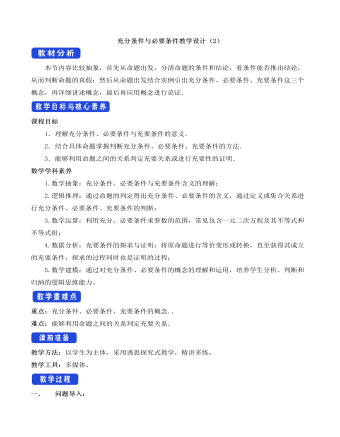
人教A版高中数学必修一充分条件与必要条件教学设计(2)
【例3】本例中“p是q的充分不必要条件”改为“p是q的必要不充分条件”,其他条件不变,试求m的取值范围.【答案】见解析【解析】由x2-8x-20≤0得-2≤x≤10,由x2-2x+1-m2≤0(m>0)得1-m≤x≤1+m(m>0)因为p是q的必要不充分条件,所以q?p,且p?/q.则{x|1-m≤x≤1+m,m>0}?{x|-2≤x≤10}所以m>01-m≥-21+m≤10,解得0<m≤3.即m的取值范围是(0,3].解题技巧:(利用充分、必要、充分必要条件的关系求参数范围)(1)化简p、q两命题,(2)根据p与q的关系(充分、必要、充要条件)转化为集合间的关系,(3)利用集合间的关系建立不等关系,(4)求解参数范围.跟踪训练三3.已知P={x|a-4<x<a+4},Q={x|1<x<3},“x∈P”是“x∈Q”的必要条件,求实数a的取值范围.【答案】见解析【解析】因为“x∈P”是x∈Q的必要条件,所以Q?P.所以a-4≤1a+4≥3解得-1≤a≤5即a的取值范围是[-1,5].五、课堂小结让学生总结本节课所学主要知识及解题技巧
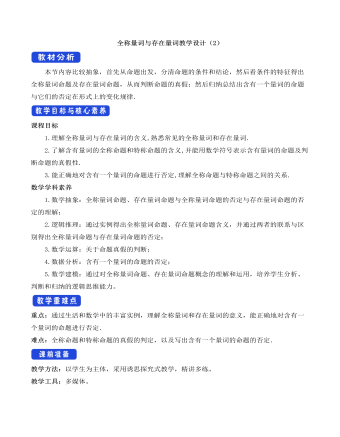
人教A版高中数学必修一全称量词与存在量词教学设计(2)
(4)“不论m取何实数,方程x2+2x-m=0都有实数根”是全称量词命题,其否定为“存在实数m0,使得方程x2+2x-m0=0没有实数根”,它是真命题.解题技巧:(含有一个量词的命题的否定方法)(1)一般地,写含有一个量词的命题的否定,首先要明确这个命题是全称量词命题还是存在量词命题,并找到其量词的位置及相应结论,然后把命题中的全称量词改成存在量词,存在量词改成全称量词,同时否定结论.(2)对于省略量词的命题,应先挖掘命题中隐含的量词,改写成含量词的完整形式,再依据规则来写出命题的否定.跟踪训练三3.写出下列命题的否定,并判断其真假:(1)p:?x∈R,x2-x+ ≥0;(2)q:所有的正方形都是矩形;(3)r:?x∈R,x2+3x+7≤0;(4)s:至少有一个实数x,使x3+1=0.【答案】见解析【解析】(1) p:?x∈R,x2-x+1/4<0.∵?x∈R,x2-x+1/4=(x"-" 1/2)^2≥0恒成立,∴ p是假命题.

人教A版高中数学必修一两角和与差的正弦、余弦和正切公式教学设计(2)
本节内容是三角恒等变形的基础,是正弦线、余弦线和诱导公式等知识的延伸,同时,它又是两角和、差、倍、半角等公式的“源头”。两角和与差的正弦、余弦、正切是本章的重要内容,对于三角变换、三角恒等式的证明和三角函数式的化简、求值等三角问题的解决有着重要的支撑作用。 课程目标1、能够推导出两角和与差的正弦、余弦、正切公式并能应用; 2、掌握二倍角公式及变形公式,能灵活运用二倍角公式解决有关的化简、求值、证明问题.数学学科素养1.数学抽象:两角和与差的正弦、余弦和正切公式; 2.逻辑推理: 运用公式解决基本三角函数式的化简、证明等问题;3.数学运算:运用公式解决基本三角函数式求值问题.4.数学建模:学生体会到一般与特殊,换元等数学思想在三角恒等变换中的作用。.
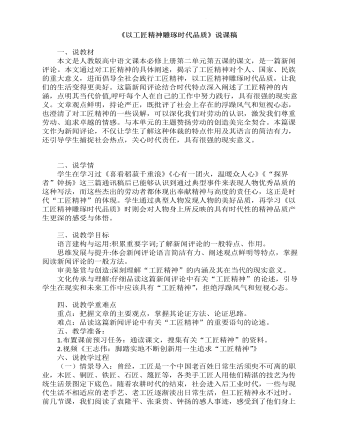
《以工匠精神雕琢时代品质》说课稿 2022-2023学年统编版高中语文必修上册
答案:铜车马的辉煌,来自原料的精挑细选、工艺的精巧极致和工匠的精心雕琢。可以说,是精益求精的工匠精神锻造出了“青铜之冠”的铜车马。2.“工匠精神”如此重要,那么,你认为“工匠精神”有着怎样的现实意义?观点一:工匠精神在企业层面,可以认为是企业精神。具体而言,表现在以下几个方面。第一,创新是企业不断发展的精神内核。第二,敬业是企业领导者精神的动力。第三,执着是企业走得长久的底气。改革开放40 多年来,我国涌现出大批有工匠精神的企业,但也有一些企业缺乏企业精神,只追求“短平快”的经济效益。这正是经济发展的隐忧所在。观点二:工匠精神在员工层面,就是一-种认真精神、敬业精神。其核心是: 不仅仅把工作当作赚钱养家糊口的工具,而是树立起对职业敬畏、对工作执着、对产品负责的态度,极度注重细节,不断追求完美和极致,给客户无可挑剔的体验。我国制造业存在大而不强、产品档次整体不高、自主创新能力较弱等现象,多少与工匠精神稀缺、“差不多精神”有关。
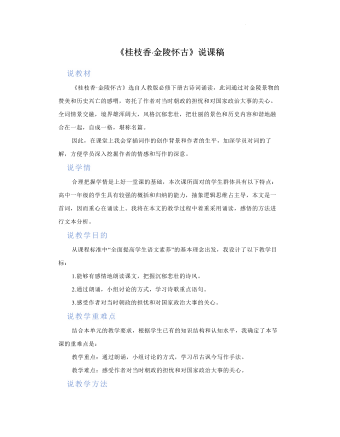
古诗词诵读《桂枝香?金陵怀古》说课稿(一) 2021-2022学年统编版高中语文必修下册
王安石,字介甫,号半山。北宋著名政治家、思想家、文学家、改革家,唐宋八大家之一。欧阳修称赞王安石:“翰林风月三千首,吏部文章二百年。老去自怜心尚在,后来谁与子争先。”传世文集有《王临川集》、《临川集拾遗》等。其诗文各体兼擅,词虽不多,但亦擅长,世人哄传之诗句莫过于《泊船瓜洲》中的“春风又绿江南岸,明月何时照我还。”且有名作《桂枝香》等。介绍之后设置这样的导入语:今天我们共同走进王安石,一起欣赏名作《桂枝香·金陵怀古》。(板书标题)(二)整体感知整体感知是赏析文章的前提,通过初读,可以使学生初步了解将要学到的基本内容,了解文章大意及思想意图,使学生对课文内容形成整体感知。首先,我会让学生根据课前预习,出声诵读课文,同时注意朗读的快慢、停顿、语调、轻重音等,然后再播放音频,纠正他们的读音与停顿。其次,我会引导学生谈谈他感受。学生通过朗读,能够说出本词雄壮、豪放、有气势,有对景物的赞美和对历史的感喟。

古诗词诵读《拟行路难(其四)》说课稿 2021-2022学年统编版高中语文选择性必修下册
(一)导入新课“时势造英雄”,恶劣的环境造就名诗名篇。正因如此,怀才不遇于古人是恒久的情感素材。同学们,请大家回忆我们学过哪些抒发作者怀才不遇的诗词?(二)解释题意拟:仿照,模拟《行路难》,是乐府杂曲,本为汉代歌谣,晋人袁山松改变其音调,创制新词,流行一时。 鲍照《拟行路难》共十八首,歌咏人世的种种忧虑,寄寓悲愤,今天我们学习的是其中第四首。(三)作者简介、写作背景门阀制度之下,“上品无寒门,下品无世族”,出身寒微的文人往往空怀一腔热忱,却报国无门,不得不在壮志未酬的遗恨中坐视时光流逝。即使跻身仕途,也多是充当幕僚、府掾,备受压抑,在困顿坎坷中徒然挣扎,只落得身心交瘁。
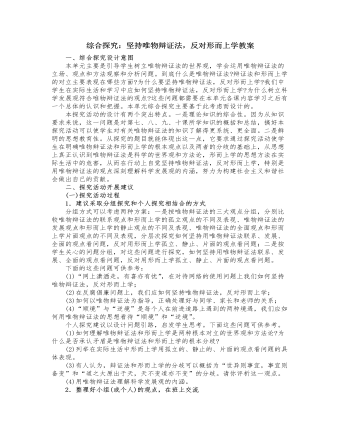
人教版高中政治必修4综合探究:坚持唯物辩证法,反对形而上学教案
5.循环经济当前,发展循环经济和知识经济已成为国际社会的两大趋势,有的发达国家甚至以立法的方式加以推进。循环经济本质上是一种生态经济,它要求运用生态学规律而不是机械的规律来指导人类社会的经济活动,减量化、再利用和资源化是其三大原则。传统经济是一种“资源——产品——污染排放”单向流动的线性经济,特征是高开采、低利用、高排放;与之不同,循环经济倡导的是一种与环境和谐的经济发展模式,它要求把经济活动组织成一个“资源——产品——再生资源”的反馈式流程,特征是低开采、高利用、低排放。目前,我国已经把发展循环经济作为编制“十一五”规划的重要指导原则。6.当心被优势“绊倒”有三个旅行者同时住进一家旅店,早上同时出门旅游。晚上归来时,拿伞的人淋得浑身是水,拿拐杖的人跌得满身是伤,而什么也没有带的人却安然无恙。
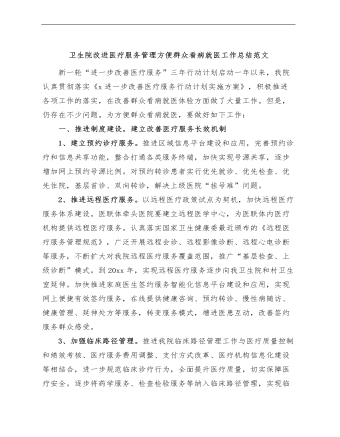
卫生院改进医疗服务管理方便群众看病就医工作总结医院汇报报告
三、切实加强领导,落实改善医疗服务工作责任1、加强组织管理,务求工作实效。要坚持以人为本,以病人为中心,切实加强组织领导,深入贯彻落实《x进一步改善医疗服务行动计划实施方案》,牢固树立服务意识,做好调研分析,以问题为导向,加强监督和指导,持续改进医疗服务管理,要统筹协调医疗资源,不断完善医疗信息化建设,加强人力资源管理,科学设计服务流程,为改善医疗服务提供基本保障,让人民群众切实感受到改善医疗服务行动计划带来的看得见摸得着的实惠。2、树立典型示范,推广先进经验。要不断发掘和树立改善医疗服务的先进典型,认真总结推广先进经验,宣传推广一批示范岗位、示范个人,形成典型带动、示范引领的工作氛围。要将宣传工作与改善医疗服务同步推进,加强与各类媒体的沟通合作,做到集中宣传与日常宣传相结合,传统媒体宣传与新兴媒体宣传相结合,持续宣传改善医疗服务典型和成效。
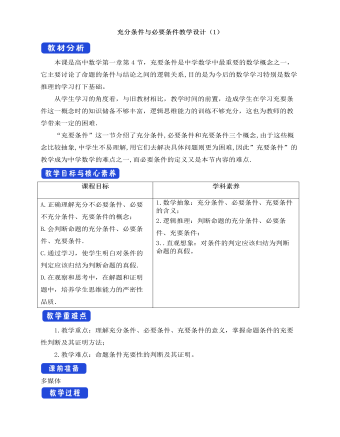
人教A版高中数学必修一充分条件与必要条件教学设计(1)
本课是高中数学第一章第4节,充要条件是中学数学中最重要的数学概念之一, 它主要讨论了命题的条件与结论之间的逻辑关系,目的是为今后的数学学习特别是数学推理的学习打下基础。从学生学习的角度看,与旧教材相比,教学时间的前置,造成学生在学习充要条件这一概念时的知识储备不够丰富,逻辑思维能力的训练不够充分,这也为教师的教学带来一定的困难.“充要条件”这一节介绍了充分条件,必要条件和充要条件三个概念,由于这些概念比较抽象,中学生不易理解,用它们去解决具体问题则更为困难,因此”充要条件”的教学成为中学数学的难点之一,而必要条件的定义又是本节内容的难点.A.正确理解充分不必要条件、必要不充分条件、充要条件的概念;B.会判断命题的充分条件、必要条件、充要条件.C.通过学习,使学生明白对条件的判定应该归结为判断命题的真假.D.在观察和思考中,在解题和证明题中,培养学生思维能力的严密性品质.



